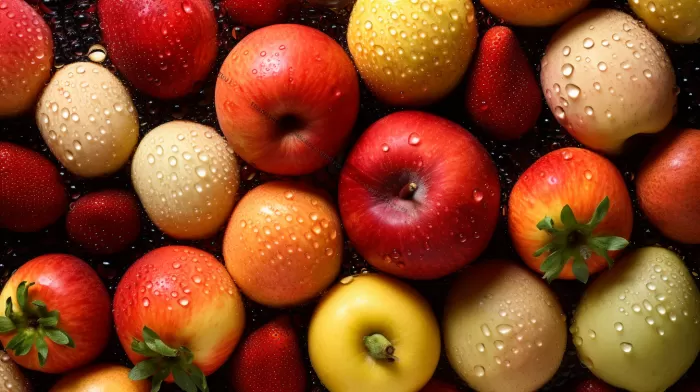Eating a diverse range of raw fruits and vegetables exposes your body to a variety of bacteria. Surprisingly, this is a good thing, as the surface bacteria found on these foods can have positive impacts on your health. Additionally, consuming more types of fruits and vegetables also supports a more diverse gut flora, which is crucial for maintaining optimal health.
A Look into the Bacterial Landscape
Austrian researchers investigated 11 different fruits and vegetables that are typically consumed raw and discovered that produce such as spinach, tomatoes, and strawberries have similar surface bacteria, with most belonging to a single family. However, fruits like apples, peaches, and grapes exhibit more diverse surface bacterial communities consisting of three or four different groups.
The study also identified differences in surface bacteria between fruits and vegetables grown using distinct farming practices.
Impact of Bacterial Differences
Various factors could contribute to the bacterial differences observed in these fruits and vegetables, such as:
- Farm locations
- Storage temperature
- Duration of storage
- Transportation methods to stores
The bacterial composition found on the surface of these produce items influences the rate at which they spoil and may even result in the spread of these microbes to surrounding areas, like kitchen counters. While the bacteria present may not cause illness, they can interact with and potentially inhibit the growth of disease-causing microbes.
Building a Healthy Gut Flora
A well-diversified gut flora plays a significant role in maintaining overall health. Consuming a variety of fruits and vegetables introduces different types of bacteria to your digestive system, enhancing its performance and supporting your immune system here.
By eating more types of produce, you help populate your gut with a healthy mix of bacteria, which is essential for digestion, absorption of nutrients, and preventing the growth of harmful organisms. A diverse bacterial community in your gut can also contribute to mood regulation, immune function, and a decrease in inflammation in your body here.
Washing Your Produce: Does It Help or Harm?
One common question is whether washing your fruits and vegetables can remove the beneficial bacteria on their surface. The answer is that while thorough washing can eliminate some bacteria, it is not possible to remove all surface microbes, so you can still benefit from their presence here.
Additionally, washing your produce can remove any harmful bacteria, such as E. coli or Salmonella often found in contaminated food. Therefore, it is still recommended to properly wash and clean your fruits and vegetables before consumption here.
Other Sources of Gut-Friendly Bacteria
While a diverse diet of raw fruits and vegetables is an excellent way to introduce various types of bacteria to your digestive system, you can also improve your gut health by consuming fermented foods like yogurt, kefir, kimchi, kombucha, or sauerkraut since they contain probiotics – beneficial microorganisms that can promote a healthy gut flora here.
In Conclusion
A healthy and diverse gut flora is essential for optimal health and wellbeing. Incorporating more raw fruits and vegetables into your diet supports the growth of beneficial bacteria within your digestive system. While the surface bacteria found on produce can interact with and potentially inhibit the growth of disease-causing microbes, they also contribute to a healthy gut microbiome.
Don’t forget to adequately wash and clean your fruits and vegetables before eating them to remove any harmful bacteria and remember that a diverse diet of raw produce and fermented foods is key to maintaining a healthy gut.



